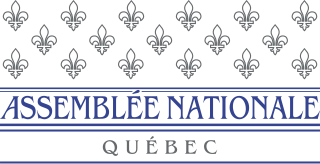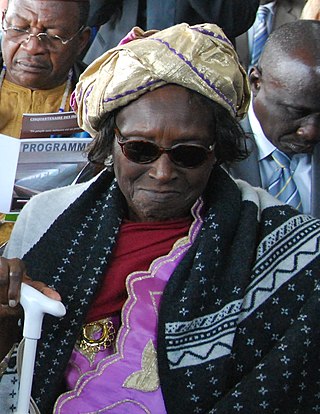The History of Benin since the 16th century, for the geographical area included in 1960 in what was then called the Republic of Dahomey before becoming the People's Republic of Benin.

The Politics of Benin take place in the framework of a presidential representative democratic republic, wherein the President of Benin is both head of state and head of government, and of a multi-party system. Executive power is exercised by the government. Legislative power is vested in both the government and the legislature. The Judiciary is independent of the executive and the legislature. The current political system is derived from the 1990 Constitution of Benin and the subsequent transition to democracy in 1991. The Economist Intelligence Unit rated Benin a "hybrid regime" in 2022.

The National Assembly is the lower house of the bicameral French Parliament under the Fifth Republic, the upper house being the Senate. The National Assembly's legislators are known as députés, meaning "delegate" or "envoy" in English; etymologically, it is a cognate of the English word deputy, the standard term for legislators in many parliamentary systems.

The National Assembly of Quebec is the legislative body of the province of Quebec in Canada. Legislators are called MNAs. The lieutenant governor of Quebec and the National Assembly compose the Legislature of Quebec, which operates in a fashion similar to those of other Westminster-style parliamentary systems. The assembly has 125 members elected first past the post from single-member districts.
Antoine Idji Kolawolé is a Beninese politician. He was the minister of foreign affairs of Benin from 1998 to 2003 and the President of the National Assembly from 2003 to 2007.

Elections in Benin take place within the framework of a multi-party democracy and a presidential system. Both the President and the National Assembly are directly elected by voters, with elections organised by the Autonomous National Electoral Commission (CENA).

Guinea elects on the national level a head of state—the president—and a legislature. The president is elected for a five-year term by the people through a two-round system. The National Assembly has 114 members, elected for five-year terms, 38 members in single-seat constituencies and 76 members by proportional representation.
Jerome Sacca Kina Guezere was a Beninese politician. He was the Fourth Vice-President of the African Union's Pan-African Parliament.
Bruno Ange-Marie Amoussou is a Beninese politician who was President of the National Assembly of Benin from 1995 to 1999 and Minister of State for Planning and Prospective Development under President Mathieu Kérékou from 1999 to 2005. He is currently a Deputy in the National Assembly. As the long-time leader of the Social Democratic Party (PSD), Amoussou stood as a presidential candidate in 1991, 1996, 2001, and 2006.

Rosine Honorine Vieyra Soglo was a Beninese politician. Soglo served as First Lady of Benin from 1991 to 1996 during the presidency of her husband, Nicéphore Soglo. She is considered the first First Lady of the democratic era following Benin's transition to a multi-party democracy.

Adrien Houngbédji is a Beninese politician and the leader of the Democratic Renewal Party, one of Benin's main political parties. He was President of the National Assembly of Benin from 1991 to 1995, Prime Minister of Benin from 1996 to 1998, and President of the National Assembly again from 1999 to 2003. Beginning in 1991, he stood repeatedly as a presidential candidate; he placed second in 2006, but was heavily defeated by Yayi Boni in a second round of voting. From 2015 to 2019, he served for a third time as President of the National Assembly.

The unicameral Assemblée nationale or National Assembly is Guinea's legislative body. Since the country's birth in 1958, it has experienced political turmoil, and elections have been called at irregular intervals, and only since 1995 have they been more than approval of a one-party state's slate of candidates. The number of seats has also fluctuated.

Thomas Boni Yayi is a Beninese banker and politician who was the president of Benin from 2006 to 2016. He took office after winning the March 2006 presidential election and was re-elected to a second term in March 2011. He also served as the chairperson of the African Union from 29 January 2012 to 27 January 2013.

Presidential elections were held in Benin on 5 March 2006. Long-term president Mathieu Kérékou, who had led the country for all but four years since 1972, was barred from running for a third term. The constitution not only stipulated an absolute two-term limit, but required presidents to be 70 years old or younger when taking office; Kérékou had turned 70 in 2003. In July 2005, Kérékou signalled that he would not seek to change the constitution, as has been done in some other African countries, so that he could run again. Kérékou's long-time rival Nicéphore Soglo was also barred from standing due to his age.

Parliamentary elections were held in Benin on 31 March 2007, having been delayed from an earlier date of 25 March due to organisational difficulties. Twenty-six political parties and 2,158 candidates contested the elections for the 83 seats in the National Assembly; there were 24 constituencies and 17,487 polling stations.
Mathurin Coffi Nago is a Beninese politician who was President of the National Assembly of Benin from 2007 to 2015. Previously he was Minister of Higher Education and Vocational Training from 2006 to 2007.
Kamarou Fassassi was a Beninese politician.

Parliamentary elections were held in Benin on 30 April 2011, after being delayed from 17 April 2011. Turnout was reportedly low. The election saw a six-seat increase for the Cauri Forces for an Emerging Benin, composed of allies of the president Yayi Boni, which took nearly half the parliamentary seats. The election consolidated Boni's victory in the 2011 presidential elections the previous month; Adrien Houngbédji, the second-placed candidate, had rejected the validity of the presidential election results.
Union Makes the Nation is an alliance of opposition political parties in Benin. It is composed of the MADEP, PSD, RB, Key Force, MDS, UNDP, MARCHE, PDPS and RDL VIVOTEN, and therefore represents an expansion of the Alliance for a Democratic Dynamic to embrace most of the significant Beninese parties opposed to the government of President Yayi Boni. The Union contested the 2011 presidential and parliamentary elections. Their presidential candidate, Adrien Houngbédji, was credited with 35.7% of the vote; he issued a statement rejecting the validity of the election results. In the parliamentary elections, the Union took 30 seats out of 83 to become by far the largest opposition party.
Parliamentary elections were held in Benin on 26 April 2015.










